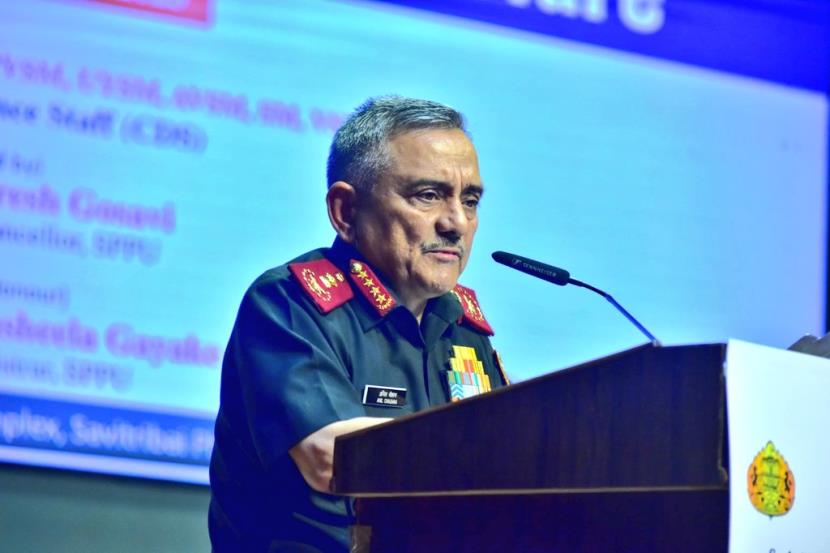Pakistan planned 48 hour operation against India but it folded up in 8 hrs: CDS Gen Anil Chauhan

Jun 04, 2025
PUNE: Pakistan launched multiple attacks on early May 10 aiming to bring India to its knees in 48 hours but it had to fold up the offensives in eight hours and reach out to New Delhi for talks seeking an end to the hostilities, Chief of Defence Staff Gen Anil Chauhan said.
In the first detailed account of India's clashes with Pakistan, Gen Chauhan said India's response to the Pahalgam terror attack was to draw "limits" of tolerance" to cross border terrorism and not tolerating Islamabad's nuclear blackmail.
In an address at the Savitribai Phule Pune University, the top military commander appeared to reject criticism against him for acknowledging three days ago that India lost an unspecified number of combat jets during the initial phase of Operation Sindoor.
Professional militaries are not affected by temporary losses as overall outcomes are much more important than such setbacks, he said and used cricketing metaphor to draw a clear distinction between initial setbacks and the overall outcome.
Suppose you go into a cricket test match and you win by an innings, then there is no question of wickets and balls etc, he said.
Gen Chauhan, who played a key role in planning India's response to the Pahalgam terror attack as well as subsequent Pakistani offensives, threw light on various aspects of the conflict.
"On May 10, at about 1 am, their (Pakistan) aim was to get India to its knees in 48 hours. Multiple attacks were launched and in some manner, they have escalated this conflict. We had actually hit only terrorist targets," he said.
"It was also rational on their part as the operation which they thought would continue for 48 hours folded up in about eight hours. And then they picked up the telephone and said they wanted to talk (to us)," he said.
The Chief of Defence Staff said the rationale behind Pakistan's decision could be based on two aspects.
"One they must have assumed that if they continue, they are likely to lose much more. And second since they had stuck us at multiple fronts, they still did not have the benefit of understanding what they had struck," he said.
When the request for talks and de-escalation came from Pakistan, we did accept it, he said.
India launched Operation Sindoor on May 7, targeting terrorist infrastructure in territories controlled by Pakistan in response to the Pahalgam terror attack.
The strikes triggered four days of intense clashes that ended with an understanding on stopping the military actions on May 10.
New Delhi has been maintaining that India's fierce counter-attack that day forced Pakistan to plead for ending the hostilities.
Gen Chauhan said Pakistan has been following an approach of bleeding India by thousand cuts.
"Operation Sindoor, as per the government is concerned, is not about retribution. I think it was about drawing these limits of tolerance. Thus, and not far," he said.
"This state-sponsored terrorism from Pakistan had to stop, and Pakistan should not be able to hold India hostage to terror activities," he said.
The top military officer also said Operation Sindoor reflected that India was not going to live under the shadow of terror or nuclear blackmail.
To a specific question on Pakistan's losses in terms of aircraft, Gen Chauhan said Indian military may soon come out with the data.
"Based on technical parameters, we will take out this particular data and share it with you. We will tell you how many aircraft we destroyed and how many radars we destroyed," he said.
Gen Chauhan also elaborated on the risks involved in the operations.
"You can't be 100 per cent prepared for every kind of contingency, and you can't have 100 per cent of the information about that. So you are always groping around in the dark when you are carrying out military operations."
"In every military operation, there is an element of risk involved. The only thing is that it should be a calculated kind of a risk," he said.
The Chief of Defence Staff also highlighted various elements of war including politics and violence and noted that in Operation Sindoor too, "war and politics was happening as a parallel kind of phenomenon".
Gen Chauhan also made a mention about Pakistan Army chief Gen Asim Munir "spewing venom" against India and Hindus just weeks before the Pahalgam attack to emphasise that Islamabad's approach has been to "bleed India by thousand cuts".
Weeks before the Pahalgam attack, Gen Munir said Pakistan will not forget the issue of Kashmir, asserting "It was our jugular vein."
The Chief of Defence Staff said "what happened in Pahalgam was profound cruelty towards victims."
On India's military offensives, he said Indian armed forces carried out very deliberate precision strikes on Pakistani targets and some of them were as narrow as two metres.
"Operation Sindoor is not over as yet. It continues. It's a temporary cessation of hostilities. There is a need to keep our guard up," he said.
Gen Chauhan also recalled how Pakistani leaders have been nurturing hatred against India.
"In 1965, Zulfikar Ali Bhutto spoke of a thousand-year war against India.
Just two days before the Pahalgam attack, Pakistan Army Chief Asim Munir made incendiary remarks against Hindus," he said.
The military officer also delved into some technical aspects of the conflict.
"It combined kinetic and non-kinetic means, was non-linear in nature, and featured simultaneous strikes at the LoC (Line of Control)," he said.
On India's overall approach, he said "We have raised the bar; we have connected terror to water, we have drawn a new line of military operation against terror."